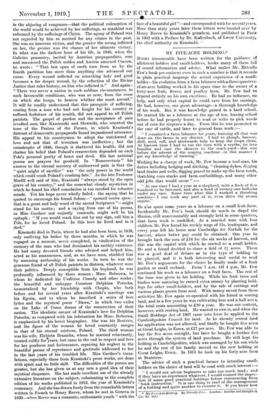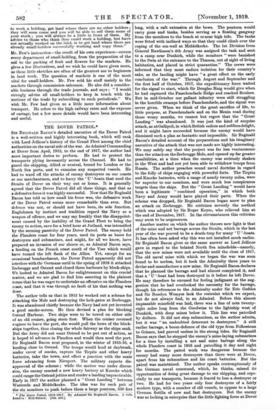MY FIVE-ACRE HOLDING.* Boons innumerable have been written for the guidance of allotment-holders and small-holders, books many of them full
of sound information and advice. What makes Mr. Metcalfe Few's book pre-eminent even in such a number is that it records in plain practical language the actual experience of a small holder—his evolution from a farm labourer with a three-quarters
of-an-acre holding worked in his spare time to the owner of a forty-acre fruit, flower, and poultry farm. Mr. Few had to depend entirely on his own exertions. He had no influence, no help, and only what capital he could save from his earnings. He had, however, one great advantage—a thorough knowledge of his work. But it was knowledge gained in a hard school.
He started life as a labourer at the age of ten, leaving school before he had properly learnt to read or write to pick weeds out of corn for sixpence a day. From this he was promoted to the care of cattle, and later to general farm work :—
" I remained a farm labourer for years, learning all that was done on the farms in my district. I had to plough, harrow, drill, seed, roll, and afterwards help to keep the crops clean. At harvest time I had to cut the corn with a scythe, tie into bundles and cart the sheaves to the stack-yard—this was before the advent of the reaping machine--in this manner I got my knowledge of farming."
Wishing for a change of work, Mr. Few became a tool-man, his duties including hedging and ditching, " cleaning dykes, digging land drains and wells, digging gravel to make up the farm roads, thatching corn stacks and farm outbuildings, and many other odd jobs that would occur " :
" At one time I had a year as a shepherd, with a flock of five hundred to be fattened, and also a herd of twenty-one bullocks under my care. Some time after this I worked a threshing machine—I can work any part of it, even drive the steam engine."
He a!so spent some years as a labourer on a small fruit farm. Incidentally Mr. Few's book should do much to dispel the illusion, still unaccountably and strongly held in some quarters, that farm work is unskilled. As a married man with four children Mr. Few found his weekly wage of 15s. inadequate, and every year left his home near Cambridge for Norfolk for the harvest, where better pay could be obtained. One year he
brought back the sum of £14 for the six weeks of harvest, and this was the capital with which he started a9 a small holder. He and a friend decided to share a field of 11 acres. There was a good deal of debate as to the typo of holding to be planted, and it is both interesting and useful to read Mr. Few's arguments for the choice he finally made of a fruit
garden or small orchard. From 7 a.m. till 4 p.m. Mr. Few continued his work as a labourer on a fruit farm. The rest of the time was given to his holding. While his fruit trees and bushes were maturing he earned extra, money by planting holdings for other small-holders, and by the sale of cuttings and various plants grown from seed. With money saved from these
activities Mr. Few again co-operated with his friend in renting land, and in a few years he was cultivating four and a half acres,
the total rents amounting to £30 a year. He was not content, however, with renting land. He wanted to own it, and when the Small Holdings Act of 1907 came into force he applied to the Cambridgeshire Council for land. As he already rented land his application was not allowed, and finally he bought five acres at Great Leighs, in Essex, at £27 per acre. Mr. Few was able to buy the five acres outright, but later he bought a further five acres through the system of land purchase. Ho still kept his holding in Cambridgeshire, which was managed by his son while be and the rest of his family moved to the new holding at Great Leighs, Essex. In 1915 he took up his forty-acre farm at Braintree.
The advice of such a practical farmer to intending small holders on the choice of land will be read with much interest :
" I would not advise beginners to take too much land ; and if they have no experience whatever, I would counsel the inspection of some good practical holdings before commencing from ' book instruction.' It is one thing to read of the management of a holding and quite another to execute it. If you know how
to work a holding, get land where there are no other holders ; they will soon come and you will be able to sell them some of your stock ; you will always be a little in front of them. My advice to those who think they could work a holding, but have not actually worked on the land, is to get land where there are already small-holders successfully working and copy them."
Mr. Few's instruction—the result of his own experience—covers every department of small-holding, from the preparation of the sail to the packing of fruit and flowers for the markets. He gives a few illustrations, and we wish he could have given more, as these little sketches are often of the greatest use to beginners in land work. The question of markets is one of the most vital for small-holders. Mr. Few sold his stuff mainly in the markets through commission salesmen. He also did a considerable business through the trade journals, and says : " I would strongly advise all small-holders to keep in touch with the motions of the trade by subscribing to such periodicals." We wish Mr. Few had given us a little more information about transport. He refers to the high railway rates and the expense of cartage, but a few more details would have been interesting and useful.







































 Previous page
Previous page